Postscript SMS alternatives for e-commerce stores
No two e-commerce SMS tools are alike. While Postscript SMS is a popular choice for text messaging, check out these Postscript alternatives.

No two e-commerce SMS tools are alike. While Postscript SMS is a popular choice for text messaging, check out these Postscript alternatives.

Your online store is thriving and orders are flowing in–but if your customers can’t get easy updates on things like order confirmations, status updates, and shipping notifications, you may find your momentum slowing down.
That’s where texts come in. SMS allows you to send instant updates to your customers at every step of their shopping experience.
The question is, in a world full of SMS platforms for e-commerce businesses, which platform is right for you?
You may have heard of Postscript before (it’s a popular choice), but you’d still be wise to explore all your options before committing to a platform.
In this article, we’ll take a closer look at Postscript SMS, as well as 11 Postscript alternatives, to help you make an informed decision about your e-commerce text messaging tool.
TABLE OF CONTENTS
Postscript is an SMS platform built specifically for Shopify store owners. It helps e-commerce pros build up lists of contacts, run customer support through texting, personalize campaigns and messages using customer details, and more.
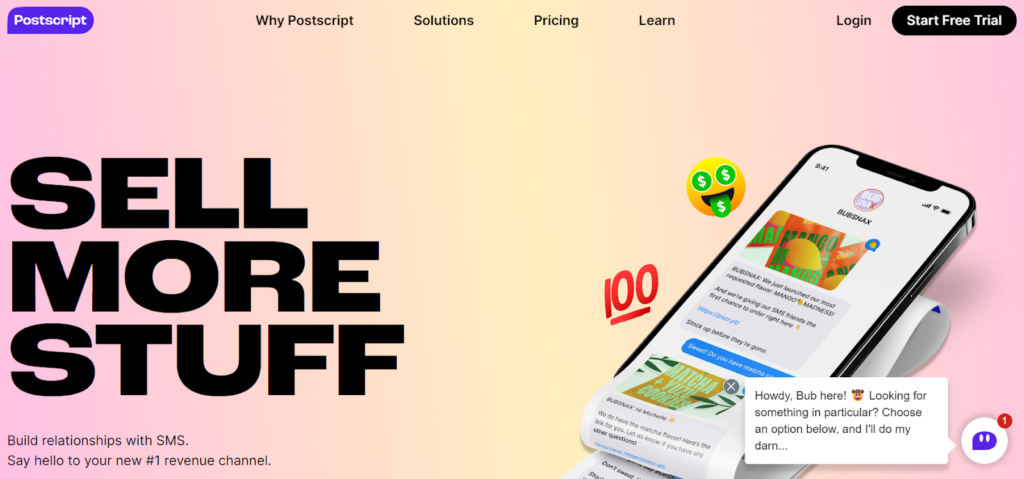
Pros: Postscript comes with a lot of helpful message automation tools, which makes it easier for brands to send shipping and delivery notifications, abandoned cart recovery texts, and special offers to keep customers tuned in and coming back for more.
You can also pull in Shopify data to analyze campaign performance.
Cons: User reviews mention that list exclusions can be difficult when segmenting, as well as a subpar experience when using Postscript on mobile.
Postscript Pricing: The platform has a free plan for SMS beginners, and paid plans starting at $100/month.
Before we get into comparing platforms and features, let’s lay out some questions you need to consider as you start your search for the perfect SMS add-on for your online store.
Ask yourself:
No two tools offer the same set of solutions, so take time to get clear on your needs before you make a decision.
One last thing: When considering pricing, be sure to find out whether unused credits will roll over to the next month.
Sometimes, the most obvious answer isn’t the right answer for you. Postscript and some of its contemporaries are popular, of course, but beware of choosing one of these tools right off the bat.
Here are a few other industry hits you may not have considered.
As the name suggests, OmniSend is a tool that aims to give e-commerce pros easy, automated use of multiple marketing channels–chiefly, email and SMS.
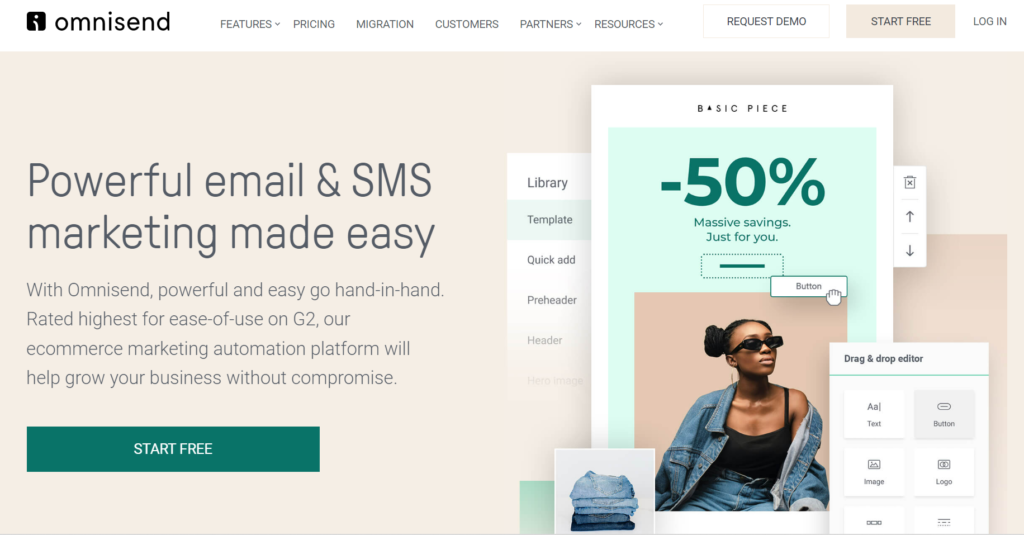
Pros: The tool offers pre-built, automated messaging flows and targeting tools to help you keep your messages specific.
Other helpful features include store integrations, 24/7 support, and straightforward analytics and reports.
Cons: The biggest drawback? If you have large lists of SMS contacts, you’re pretty much limited to the highest-priced plan OmniSend offers.
Pricing: Like a lot of e-commerce communications tools, OmniSend features a free starter plan, with their email and SMS package starting at $59/month.
Bias aside, there’s a reason SimpleTexting consistently shows up among the top names in texting — especially when it comes to e-commerce.
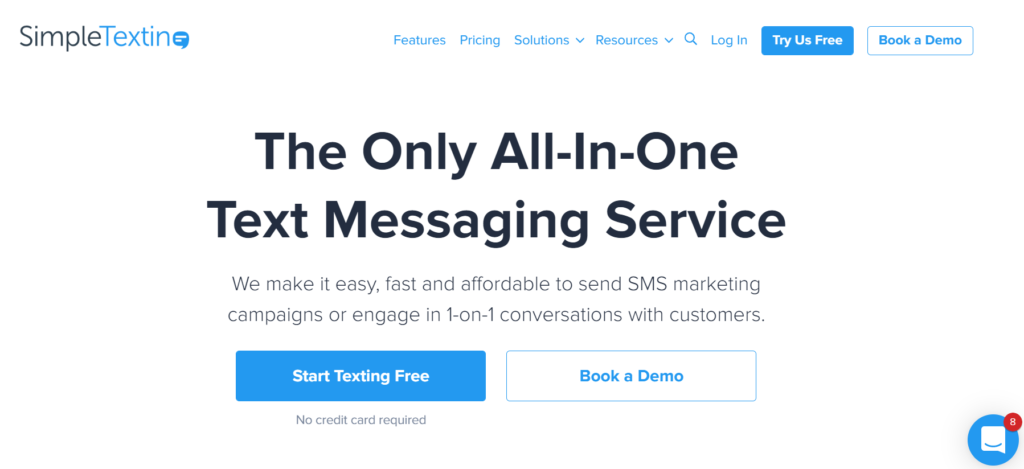
Pros: SimpleTexting offers the ideal trifecta for e-commerce stores. That is:
Cons: Fans of QR codes may be disappointed to learn that SimpleTexting doesn’t have QR code creation capabilities (you can still use QR codes to attract new contacts, you’ll just need to create them elsewhere).
Pricing: Curious business owners can try SimpleTexting’s tools out free for 14 days, with paid plans starting at $29/month.
Among SMS and e-commerce marketing platforms, Octane stands out with one unique feature: its quizzes.
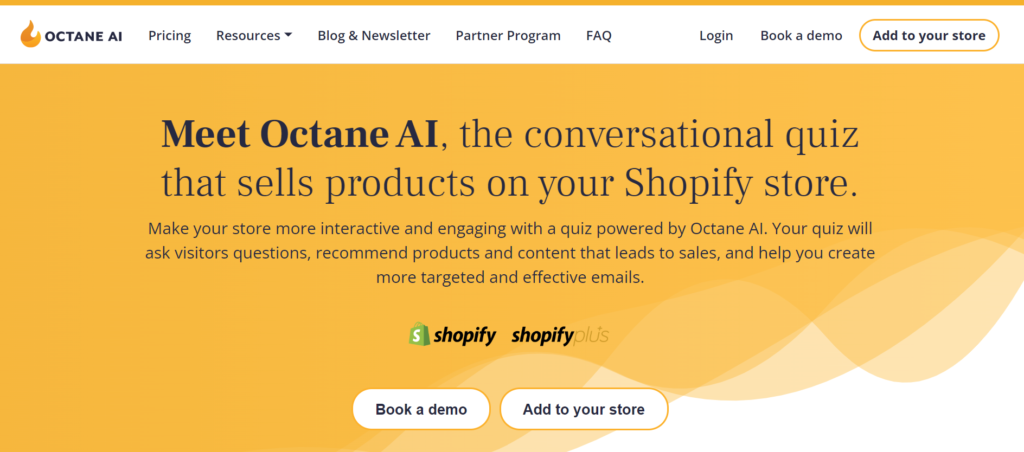
Pros: This platform allows users to build a customized product quiz to feature on your site or in ads or popups–anywhere your audience will see it.
Each quiz serves to bring in important data on your customers, including shopping preferences, contact information, and personal needs that your products can help them with.
From there, you can use all that data to create ultra-targeted SMS and email flows, so your audience only gets the offers and information they’ll take action on. Octane also offers plenty of integrations to fit in with your store’s existing workflows.
Cons: The most notable downside with Octane is the cost (plans start at $50/month).
The software comes with a relatively high price tag among e-commerce platforms, and if quiz-making isn’t a priority for you, you may get more value elsewhere.
SMSBump is a classic SMS/email software tool for e-commerce stores. It features the usual segmentation options, email and SMS automations, and performance analytics.
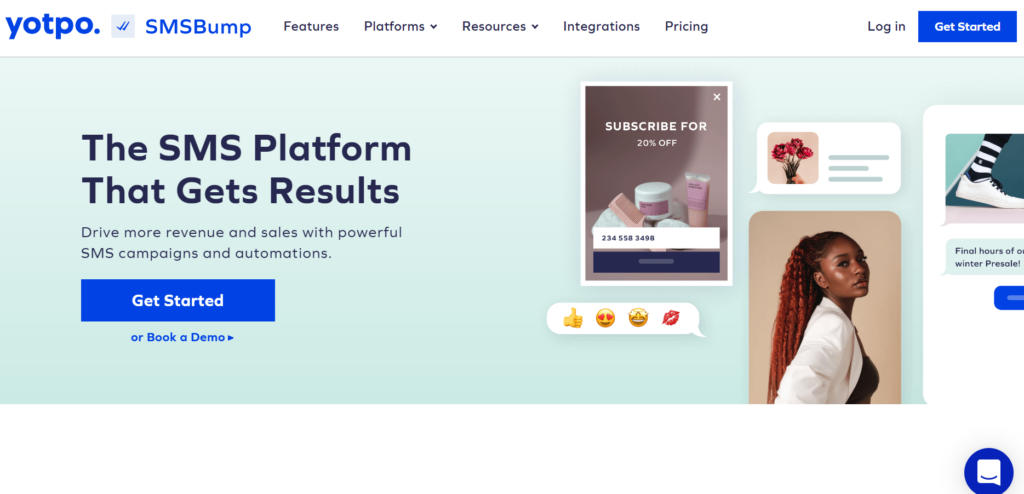
Pros: The main perk of SMSBump that helps it stand out is a focus on diverse, convenient opt-in methods.
The platform advertises opt-ins ranging from keywords to QR codes to web forms and more, meaning users have numerous ways to attract new contacts.
Cons: The platform’s main weakness is that it has relatively few options for integrations.
While it does integrate with a handful of helpful e-commerce tools, when compared with other similar platforms, users may find themselves limited in terms of available tools to integrate with.
Pricing: SMSBump offers a free plan for growing businesses, and paid plans start at $19/month.
If you’ve ever looked into SMS tools online, you’ve probably seen EZTexting listed among the most beloved platforms in its industry. That’s for a good reason.
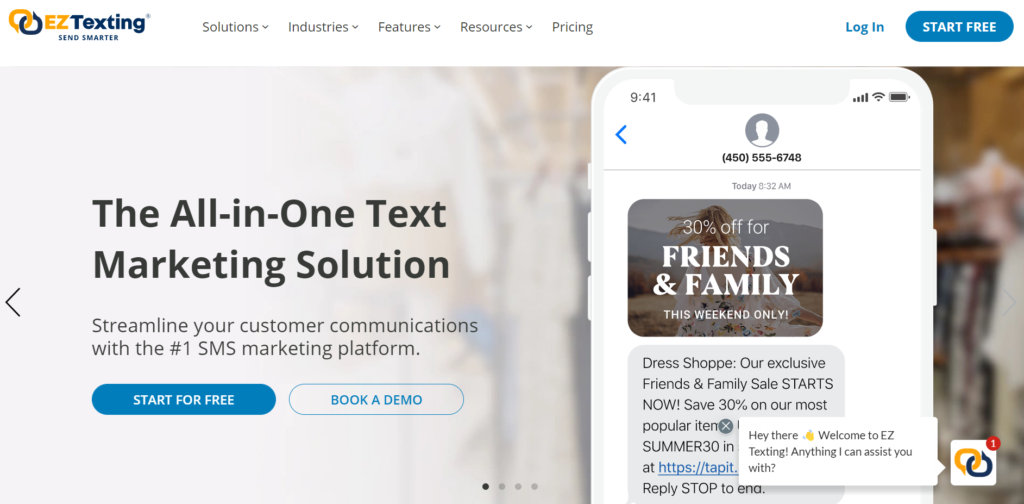
Pros: EZTexting brings an impressive array of features to the table, including:
Cons: Users have reported a lack of flexibility in sending campaigns–namely, that campaigns can’t be sent on certain number types. Other reviewers note significant support issues when using the product.
Pricing: EZTexting plans start at $20/month (billed annually) or $24/month (billed monthly).
Although it’s not just an SMS platform, Klaviyo offers text marketing tools in conjunction with email features to give e-commerce brands a well-rounded marketing strategy all in one hub.
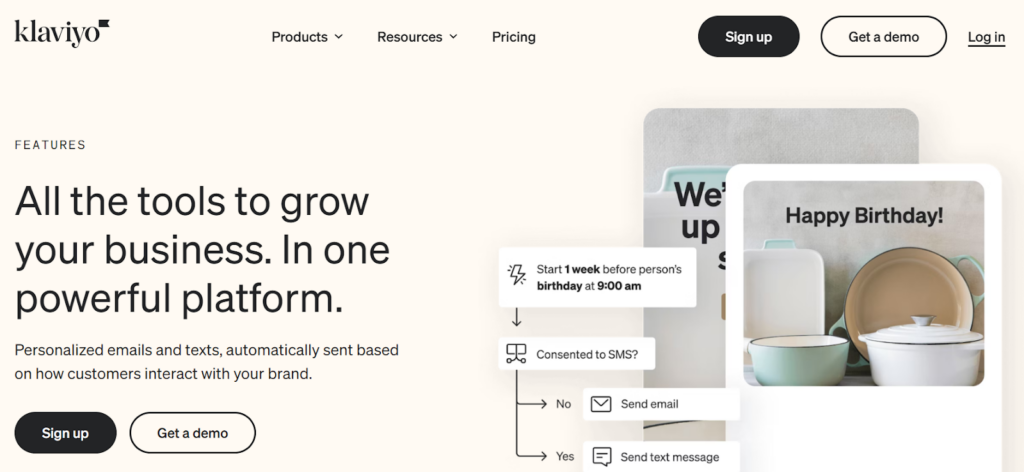
Users have access to growth and retention features like customer segmentation based on actions they’ve taken in your store, as well as A/B testing capabilities and plenty of third-party integrations.
Pros: Klaviyo brings email and SMS together to make coordinating your communications easier and more effective, which can be helpful if you favor a hybrid marketing approach.
You can map out and visualize your campaigns using the flow feature, and the platform even offers ready-made workflows for you to draw from.
Cons: The email/SMS approach is a double-edged sword. You can’t use texting with Klaviyo unless you already use their email tool, so if you’re already set up with another email provider, you’ll need to switch.
Klaviyo also limits the contacts you can send messages to, which can be a barrier to growth.
Pricing: There is a free plan on offer for those who just want to try out the platform, and their combo email-and-SMS plan starts at $35/month.
Attentive is a go-to for text marketers across a lot of industries, and that includes e-commerce brands.
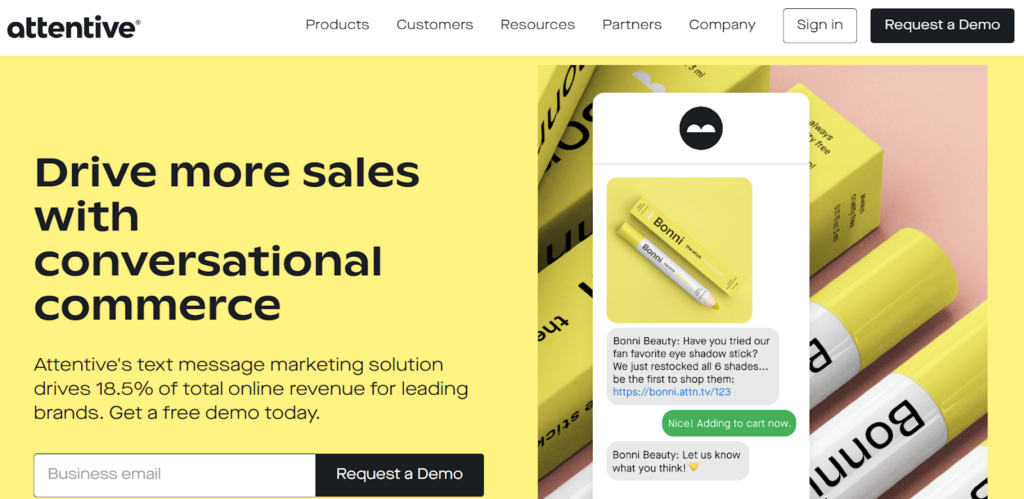
Their features include segments for personalized messaging, triggers for common events in online stores, and detailed analytics for better and better campaigns.
Pros: Attentive users have plenty of integrations to choose from, including Shopify Plus, Salesforce, Mailchimp, BigCommerce, and more, which helps bring texting into a larger, more cohesive e-commerce workflow.
Reviews also praise the customer service team, extensive resources to help new SMS marketers get started, and intuitive platform.
Cons: The standout drawback with Attentive is that pricing is not available unless you book a demo, which can make it hard for e-commerce pros to price Attentive against its competitors.
User reviews also mention a lack of flexibility when designing and setting up web sign-up forms and landing pages within Attentive.
Pricing: None available without a demo.
If you’re in the market for easy, breezy e-commerce automations, Emotive might be the right platform for you.
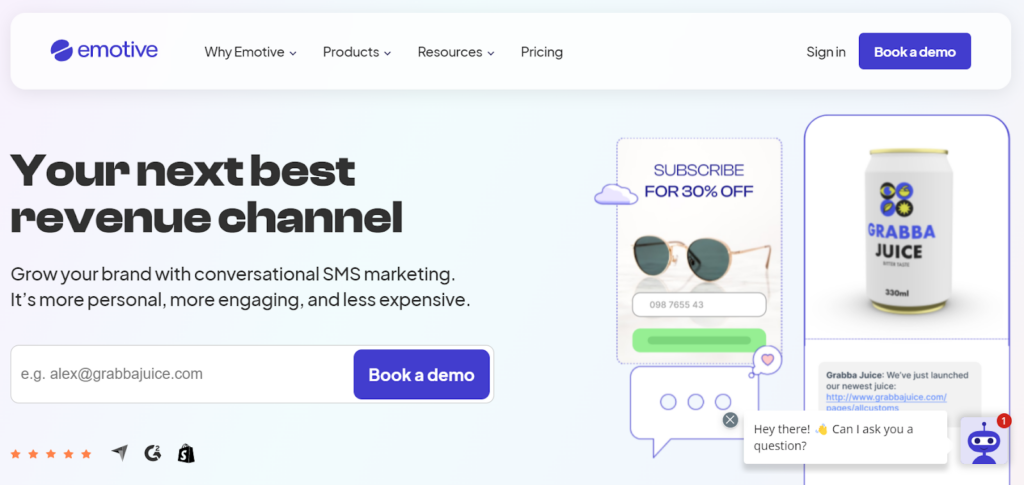
The platform lets you build out set-it-and-forget-it conversational text flows for everything from product recommendations to subscriptions to individual customer support and beyond.
Pros: E-commerce brands will find a lot of tools tailored to their daily functions, like helpful CRM integrations, segments based on customer browsing histories and buying habits, analytics, and mass texting options.
Cons: While in the past, Emotive users had access to personalized resources like a CSM and copywriter, the platform has reportedly removed these options and replaced them with a more general strategy team.
Other reviews mention difficulty sending messages to multiple segments.
Pricing: Emotive offers a 14-day free trial with plans from $100/month at $0.02 per SMS and $0.05 per MMS and a limit of 1,000 contacts.
Podium is built for local businesses. Beyond just SMS, their platform offers web chat tools, payment solutions, and voice calling features for a holistic approach to e-commerce in one software.
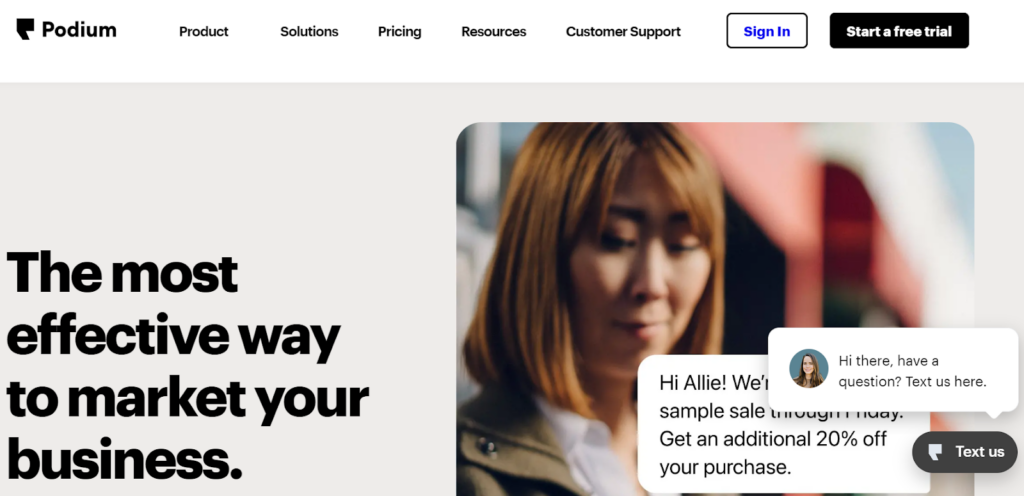
Pros: One of Podium’s highlights is its automation options. Users can set up triggers and flows to send messages like review requests, and the platform offers templates to make manual messaging that much easier.
Online stores can also take advantage of their text-to-pay tools to make collecting payments a snap.
Cons: Some users complain that Podium doesn’t perform well on mobile, presenting a challenge for on-the-go business owners, and others say that the customer service experience is lacking.
Pricing: Podium offers a free trial and paid plans from $289/month with 1,000 contacts and three team members (higher plans come with unlimited contacts and team members).
Lovers of Shopify may be drawn toward Privy because of their easy integration with the platform.
Privy also specializes in mobile-friendly shopping setups and simple, easy-to-follow SMS flows.
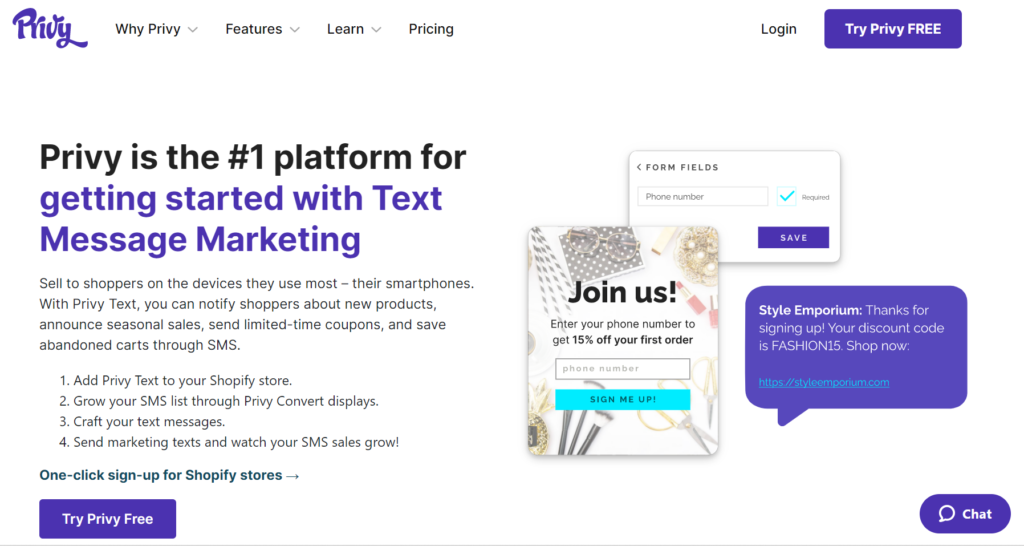
Pros: The site offers straightforward, accessible guides to Privy’s tools and features, and costs are low–the most basic Privy plan is free.
Cons: Looking for the catch? Privy keeps their message-sending caps set fairly low. An FAQ on the homepage states that users can send up to 6x the number of contacts they have per month.
If you plan to be a frequent texter, or simply don’t want your messages limited, that may be a bit of a stumbling block.
Pricing: While Privy’s basic plan is free, they offer higher-priced plans starting at $45/month (that’s the conversion, email, and SMS plan) with 75 text contacts.
SendinBlue is yet another favorite among those looking for an all-in-one tool. They bring email, chat, and SMS together with features for landing page design, Facebook ads, and sign-up forms so e-commerce store owners have plenty of outreach options to explore.
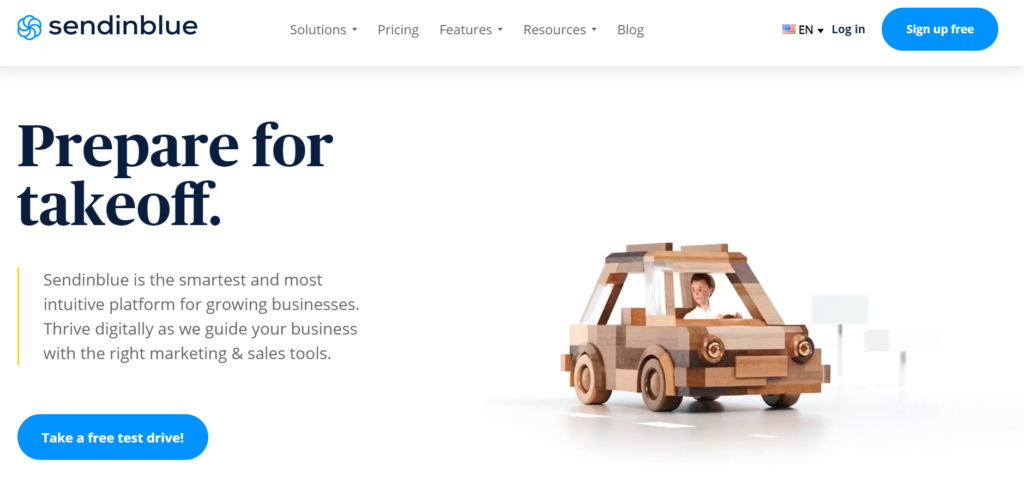
Pros:
The platform advertises:
If you don’t want to source all of your online store’s tasks out to different tools, having a comprehensive tool like SendinBlue could be your solution.
Cons: SendinBlue’s one big Achilles’ heel is the lack of accessible multi-user features. Although the platform offers logins for multiple users and logins, you’ll have to be signed up on one of their higher-tier plans to access those features.
Pricing: The basic plan is free, and paid plans start from $25/month.
No two businesses have the same needs and strategies, and you likely already have a good idea of what you want your customers to see and experience when they shop with you.
Use that as your guide when looking for the right software to help grow your marketing and customer communications.
Hopefully, this comparison has given you a good idea of which platforms might serve your needs and bring you SMS success.
Lily is a content marketing specialist at SimpleTexting. She specializes in making helpful, entertaining video content and writing blogs that help businesses take advantage of all that texting has to offer. When she’s not writing or making TikToks, you can find Lily at roller derby practice or in a yoga studio in the Seattle area.
More Posts from Lily NortonNeed a helping hand to manage your brand’s SMS strategy? Follow these steps to add your team members with just a few clicks.
ReadThe recent Netflix documentary “The Social Dilemma” portrays growth hacking as an evil tool wielded by tech giants. Is that really the case?
ReadStart a text marketing campaign or have a 1-on-1 conversation today. It's risk free. Sign up for a free 14-day trial today to see SimpleTexting in action.
No credit card required